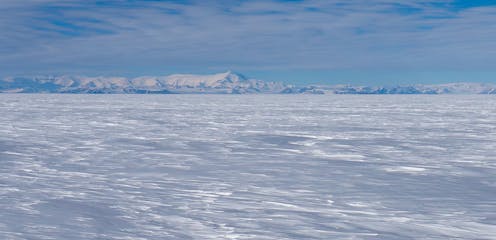West Antarctica’s ice sheet was smaller thousands of years ago – here’s why this matters today
- Written by Dan Lowry, Ice Sheet & Climate Modeller, GNS Science

As the climate warms and Antarctica’s glaciers and ice sheets melt, the resulting rise in sea level has the potential to displace hundreds of millions of people[1] around the world by the end of this century.
A key uncertainty in how much and how fast the seas will rise lies in whether currently “stable” parts of the West Antarctic Ice Sheet can become “unstable”.
One such region is West Antarctica’s Siple Coast, where rivers of ice flow off the continent and drain into the ocean.
This ice flow is slowed down by the Ross Ice Shelf, a floating mass of ice nearly the size of Spain, which holds back the land-based ice. Compared to other ice shelves in West Antarctica, the Ross Ice Shelf has little melting at its base because the ocean below it is very cold.
Although this region has been stable during the past few decades, recent research suggest this was not always the case. Radiocarbon dating of sediments[4] from beneath the ice sheet tells us that it retreated hundreds of kilometres some 7,000 years ago, and then advanced again to its present position within the last 2,000 years.
Figuring out why this happened can help us better predict how the ice sheet will change in the future. In our new research[5], we test two main hypotheses.
Read more: What an ocean hidden under Antarctic ice reveals about our planet's future climate[6]
Testing scenarios
Scientists have considered two possible explanations for this past ice sheet retreat and advance. The first is related to Earth’s crust below the ice sheet.
As an ice sheet shrinks, the change in ice mass causes the Earth’s crust to slowly uplift in response. At the same time, and counterintuitively, the sea level drops near the ice because of a weakening of the gravitational attraction between the ice sheet and the ocean water.
As the ice sheet thinned and retreated since the last ice age, crustal uplift and the fall in sea level in the region may have re-grounded floating ice[7], causing ice sheet advance.
The other hypothesis is that the ice sheet behaviour may be due to changes in the ocean. When the surface of the ocean freezes, forming sea ice, it expels salt into the water layers below. This cold briny water is heavier and mixes deep into the ocean, including under the Ross Ice Shelf. This blocks warm ocean currents from melting the ice.
Seafloor sediments and ice cores[12] tell us that this deep mixing was weaker in the past when the ice sheet was retreating. This means that warm ocean currents may have flowed underneath the ice shelf and melted the ice. Mixing increased when the ice sheet was advancing.
We test these two ideas with computer model simulations of ice sheet flow and Earth’s crustal and sea surface responses to changes in the ice sheet with varying ocean temperature.
Because the rate of crustal uplift depends on the viscosity (stickiness) of the underlying mantle, we ran simulations within ranges estimated for West Antarctica. A stickier mantle means slower crustal uplift as the ice sheet thins.
The simulations that best matched geological records had a stickier mantle and a warmer ocean as the ice sheet retreated. In these simulations, the ice sheet retreats more quickly as the ocean warms.
When the ocean cools, the simulated ice sheet readvances to its present-day position. This means that changes in ocean temperature best explain the past ice sheet behaviour, but the rate of crustal uplift also affects how sensitive the ice sheet is to the ocean.
What this means for climate policy today
Much attention has been paid to recent studies[14] that show glacial melting may be irreversible in some parts of West Antarctica, such as the Amundsen Sea embayment.
In the context of such studies, policy debates hinge on whether we should focus on adapting to rising seas rather than cutting greenhouse gas emissions. If the ice sheet is already melting, are we too late for mitigation?
Read more: We can still prevent the collapse of the West Antarctic ice sheet – if we act fast to keep future warming in check[15]
Our study suggests it is premature to give up on mitigation.
Global climate models run under high-emissions scenarios show less sea ice formation and deep ocean mixing[16]. This could lead to the same cold-to-warm ocean switch that caused extensive ice sheet retreat thousands of years ago.
For West Antarctica’s Siple Coast, it is better if we prevent this ocean warming from occurring in the first place, which is still possible if we choose a low-emissions future.
References
- ^ hundreds of millions of people (www.ipcc.ch)
- ^ Journal of Geophysical Research (www.researchgate.net)
- ^ CC BY-SA (creativecommons.org)
- ^ Radiocarbon dating of sediments (agupubs.onlinelibrary.wiley.com)
- ^ new research (www.nature.com)
- ^ What an ocean hidden under Antarctic ice reveals about our planet's future climate (theconversation.com)
- ^ re-grounded floating ice (www.nature.com)
- ^ AGU (agupubs.onlinelibrary.wiley.com)
- ^ CC BY-SA (creativecommons.org)
- ^ AGU (agupubs.onlinelibrary.wiley.com)
- ^ CC BY-SA (creativecommons.org)
- ^ sediments and ice cores (www.nature.com)
- ^ CC BY-SA (creativecommons.org)
- ^ recent studies (www.nature.com)
- ^ We can still prevent the collapse of the West Antarctic ice sheet – if we act fast to keep future warming in check (theconversation.com)
- ^ deep ocean mixing (www.nature.com)
















